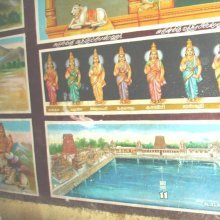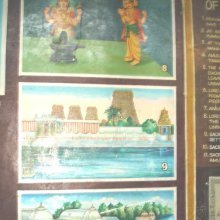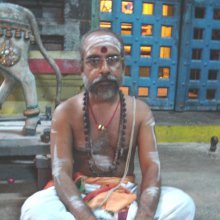Mahamaha, Maha-maha, Mahāmaha: 8 definitions
Introduction:
Mahamaha means something in Hinduism, Sanskrit. If you want to know the exact meaning, history, etymology or English translation of this term then check out the descriptions on this page. Add your comment or reference to a book if you want to contribute to this summary article.
Images (photo gallery)
In Hinduism
Purana and Itihasa (epic history)
Source: Cologne Digital Sanskrit Dictionaries: The Purana IndexMahāmaha (महामह).—A commander of Bhaṇḍa.*
- * Brahmāṇḍa-purāṇa IV. 21. 86.

The Purana (पुराण, purāṇas) refers to Sanskrit literature preserving ancient India’s vast cultural history, including historical legends, religious ceremonies, various arts and sciences. The eighteen mahapuranas total over 400,000 shlokas (metrical couplets) and date to at least several centuries BCE.
Languages of India and abroad
Sanskrit dictionary
Source: DDSA: The practical Sanskrit-English dictionaryMahāmaha (महामह).—a great festive procession; Sinhās.
Derivable forms: mahāmahaḥ (महामहः).
Mahāmaha is a Sanskrit compound consisting of the terms mahā and maha (मह).
Source: Cologne Digital Sanskrit Dictionaries: Edgerton Buddhist Hybrid Sanskrit DictionaryMahāmahā (महामहा).—(mss. °ha), name of the mother of the Maruts: Divyāvadāna 635.5.
Source: Cologne Digital Sanskrit Dictionaries: Cappeller Sanskrit-English DictionaryMahāmaha (महामह).—[adjective] very mighty.
Source: Cologne Digital Sanskrit Dictionaries: Monier-Williams Sanskrit-English Dictionary1) Mahāmaha (महामह):—[=mahā-maha] [from mahā > mah] 1. mahā-maha m. a great festive procession, [Siṃhāsana-dvātriṃśikā or vikramāditya-caritra, jaina recension]
2) [v.s. ...] 2. mahā-maha mfn. ([probably] an old [Intensive] form) very mighty, [Ṛg-veda]
3) Mahāmahā (महामहा):—[=mahā-mahā] [from mahā-maha > mahā > mah] f. Name of a constellation, [Skanda-purāṇa]
4) [v.s. ...] a species of plant ([wrong reading] for -sahā), [Caraka] (cf. the similar forms ghanāghana, patāpata, vadāvada.)
[Sanskrit to German]
Sanskrit, also spelled संस्कृतम् (saṃskṛtam), is an ancient language of India commonly seen as the grandmother of the Indo-European language family (even English!). Closely allied with Prakrit and Pali, Sanskrit is more exhaustive in both grammar and terms and has the most extensive collection of literature in the world, greatly surpassing its sister-languages Greek and Latin.
Kannada-English dictionary
Source: Alar: Kannada-English corpusMahāmaha (ಮಹಾಮಹ):—[adjective] most precius; highly valuable.
--- OR ---
Mahāmaha (ಮಹಾಮಹ):—
1) [noun] a great feast.
2) [noun] (jain.) a religious worshipping of a Jina, the spiritual teacher, by a king.
Kannada is a Dravidian language (as opposed to the Indo-European language family) mainly spoken in the southwestern region of India.
See also (Relevant definitions)
Partial matches: Maha.
Starts with: Mahamahadevi, Mahamaham, Mahamahana, Mahamahantaka, Mahamahargha, Mahamahas, Mahamahattaka, Mahamahattama, Mahamahattara, Mahamahavaruni.
Query error!
Full-text (+6): Mahamahas, Maha, Mahamaham, Mahasaha, Ashvaya, Gavya, Brahmatirtha, Agastyeshvara, Dhaneshvara, Brahmeshvara, Brahmatirtheshvara, Kukundeshvara, Kukunda, Idapeshvara, Baraneshvara, Koneshvara, Baktikeshvara, Byraveshvara, Vyaseshvara, Tritishvara.
Relevant text
Search found 13 books and stories containing Mahamaha, Maha-maha, Mahā-maha, Mahā-mahā, Mahāmaha, Mahāmahā; (plurals include: Mahamahas, mahas, mahās, Mahāmahas, Mahāmahās). You can also click to the full overview containing English textual excerpts. Below are direct links for the most relevant articles:
World Journal of Pharmaceutical Research
Analysis of physico-chemical factors and fungi in Mahamaham tank. < [2017: Volume 6, December special issue 17]
Rig Veda (translation and commentary) (by H. H. Wilson)
Notices of Sanskrit Manuscripts (by Rajendralala Mitra)
Brihad Bhagavatamrita (commentary) (by Śrī Śrīmad Bhaktivedānta Nārāyana Gosvāmī Mahārāja)
Verse 2.4.62-63 < [Chapter 4 - Vaikuṇṭha (the spiritual world)]
Chaitanya Bhagavata (by Bhumipati Dāsa)
Verse 1.13.36 < [Chapter 13 - Defeating Digvijayī]
Verse 2.10.269 < [Chapter 10 - Conclusion of the Lord’s Mahā-prakāśa Pastimes]
Verse 3.5.362 < [Chapter 5 - The Pastimes of Nityānanda]
Puranic encyclopaedia (by Vettam Mani)





